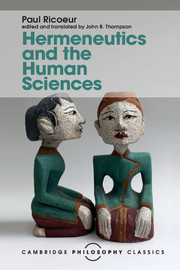Book contents
- Frontmatter
- Contents
- Preface to this edition
- Acknowledgements
- Editor's introduction
- Notes on editing and translating
- A response by Paul Ricoeur
- Part I Studies in the history of hermeneutics
- 1 The task of hermeneutics
- 2 Hermeneutics and the critique of ideology
- 3 Phenomenology and hermeneutics
- Part II Studies in the theory of interpretation
- Part III Studies in the philosophy of social science
- Select bibliography
- Index
3 - Phenomenology and hermeneutics
from Part I - Studies in the history of hermeneutics
Published online by Cambridge University Press: 05 July 2016
- Frontmatter
- Contents
- Preface to this edition
- Acknowledgements
- Editor's introduction
- Notes on editing and translating
- A response by Paul Ricoeur
- Part I Studies in the history of hermeneutics
- 1 The task of hermeneutics
- 2 Hermeneutics and the critique of ideology
- 3 Phenomenology and hermeneutics
- Part II Studies in the theory of interpretation
- Part III Studies in the philosophy of social science
- Select bibliography
- Index
Summary
This study does not aim to be a contribution to the history of phenomenology, to its archaeology, but rather an inquiry into the destiny of phenomenology today. And if I have chosen the general theory of interpretation or hermeneutics as a touchstone, that does not mean either that I would replace an historical monograph by a chapter on the comparative history of modern philosophy. For with hermeneutics as well, I do not wish to proceed as an historian, even as an historian of the present day. Whatever may be the dependence of the following meditation on Heidegger and above all on Gadamer, what is at stake is the possibility of continuing to do philosophy with them and after them – without forgetting Husserl. Thus my essay will seek to be a debate about the ways in which philosophy can still be pursued.
I propose the following two theses for discussion. First thesis: what hermeneutics has ruined is not phenomenology but one of its interpretations, namely its idealistic interpretation by Husserl himself; accordingly, I shall speak henceforth of Husserlian idealism. I shall take the ‘Nachwort’ to the Ideen as a reference and a guide, submitting its principal theses to the hermeneutical critique. The first part of the essay will thus be purely and simply antithetical.
Second thesis: beyond the simple opposition there exists, between phenomenology and hermeneutics, a mutual belonging which it is important to make explicit. This belonging can be recognised from either position. On the one hand, hermeneutics is erected on the basis of phenomenology and thus preserves something of the philosophy from which it nevertheless differs: phenomenology remains the unsurpassable presupposition of hermeneutics. On the other hand, phenomenology cannot constitute itself without a hermeneutical presupposition. The hermeneutical condition of phenomenology is linked to the role of Auslegung [explication] in the fulfilment of its philosophical project.
The hermeneutical critique of Husserlian idealism
The first part of this essay seeks to disclose the gap, if not the gulf, which separates the project of hermeneutics from all idealistic expressions of phenomenology. The antithetical position of the two philosophical projects will alone be developed. We shall nevertheless reserve the possibility that phenomenology as such is not wholly exhausted by one of its interpretations, even that of Husserl himself. It is, in my view, Husserlian idealism which succumbs to the hermeneutical critique.
- Type
- Chapter
- Information
- Hermeneutics and the Human SciencesEssays on Language, Action and Interpretation, pp. 61 - 90Publisher: Cambridge University PressPrint publication year: 2016
- 9
- Cited by

